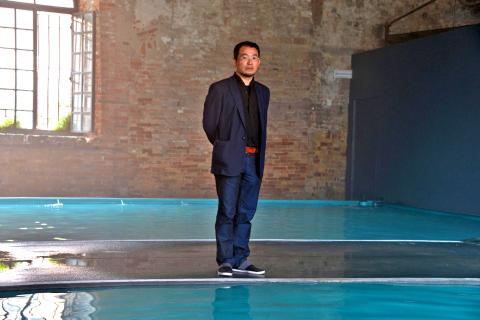Taiwanese artist Vincent Huang (黃瑞芳), representing Tuvalu at one of the world’s premier contemporary art exhibitions, has created a “flooded pavilion” to highlight the perils facing the South Pacific island country as a result of climate change.
Huang’s latest project, developed in cooperation with Dutch-born curator Thomas Berghuis, is now on display at Tuvalu’s national pavilion at the Venice Biennial, which is being held May 9 to Nov. 22 in Italy under the theme All the World’s Futures.
The installation, titled Crossing the Tide, adopts ideas from the Taoist classic book Zhuangzi, focusing on the concept of “man and nature as one,” Huang told CNA.

Photo: EPA, Andrea Merola
Spread over 300 square meters, the pavilion addresses the issue of mankind’s pursuit of economic and material gains in today’s capitalist world and the impact on the natural environment, the 44-year-old artist said.
“The installation depicts a scene of only the sea and the sky, symbolizing the disappearance of land masses” as a result of rising sea levels caused by global warming, said Huang, who has visited Tuvalu twice to set up eco-art projects aimed at drawing attention to the country’s vulnerability to climate change.
To create a sea effect, Huang’s team pumped water from Venice’s canals to the venue, while clouds are created by machines ejecting smoke every 10 minutes. Wooden bridges have been erected at the venue to allow visitors to cross the “sea,” Huang said.
“The sea is crystal blue, because that is the color of Tuvalu’s lagoon,” he said.
The display, which cost about NT$12 million (US$394,000) to produce, has grabbed the attention of the international media and attracted hundreds of thousands of visitors, Huang said.
The Tuvalu government’s special envoy, parliamentarian Samuelu Penitala Teo, has also visited the pavilion and has seen what art can do for his country, Huang said.
Through the project, Huang hopes to provoke people into thinking about environmental justice.
Developing countries such as Tuvalu are at risk because of developed countries’ pursuit of economic gains and massive carbon emissions, he said.
The flooded pavilion not only addresses the crisis facing Tuvalu, but also echoes the situation regarding Venice, which is surrounded by water and is also sinking because of rising sea levels, Huang said.
Huang said he will return to Italy later this year to organize other events at the Venice Biennial.
To continue his efforts to help Tuvalu, he said, he is planning to launch an online crowdfunding platform to help Tuvalu fight its environmental crisis.
A low-lying nation, Tuvalu could be one of the first victims of rising sea levels caused by global climate change.
It is the second time that Huang has been commissioned by the Tuvalu government to organize the country’s national pavilion at the Venice Biennial.
He also worked on Tuvalu’s behalf at exhibitions held in conjunction with the UN climate change conferences in 2012 and 2013.
Concerned about the peril of rising sea levels faced by Tuvalu, one of Taiwan’s diplomatic allies, Huang visited the country in 2010 and 2012, setting up art installations to draw attention to the crisis.

Not long into Mistress Dispeller, a quietly jaw-dropping new documentary from director Elizabeth Lo, the film’s eponymous character lays out her thesis for ridding marriages of troublesome extra lovers. “When someone becomes a mistress,” she says, “it’s because they feel they don’t deserve complete love. She’s the one who needs our help the most.” Wang Zhenxi, a mistress dispeller based in north-central China’s Henan province, is one of a growing number of self-styled professionals who earn a living by intervening in people’s marriages — to “dispel” them of intruders. “I was looking for a love story set in China,” says Lo,

It was on his honeymoon in Kuala Lumpur, looking out of his hotel window at the silvery points of the world’s tallest twin skyscrapers, that Frank decided it was time to become taller. He had recently confessed to his new wife how much his height had bothered him since he was a teenager. As a man dedicated to self-improvement, Frank wanted to take action. He picked up the phone, called a clinic in Turkey that specializes in leg lengthening surgery — and made a booking. “I had a lot of second thoughts — at the end of the day, someone’s going

In the next few months tough decisions will need to be made by the Taiwan People’s Party (TPP) and their pan-blue allies in the Chinese Nationalist Party (KMT). It will reveal just how real their alliance is with actual power at stake. Party founder Ko Wen-je (柯文哲) faced these tough questions, which we explored in part one of this series, “Ko Wen-je, the KMT’s prickly ally,” (Aug. 16, page 12). Ko was open to cooperation, but on his terms. He openly fretted about being “swallowed up” by the KMT, and was keenly aware of the experience of the People’s First Party

Standing on top of a small mountain, Kim Seung-ho gazes out over an expanse of paddy fields glowing in their autumn gold, the ripening grains swaying gently in the wind. In the distance, North Korea stretches beyond the horizon. “It’s so peaceful,” says the director of the DMZ Ecology Research Institute. “Over there, it used to be an artillery range, but since they stopped firing, the nature has become so beautiful.” The land before him is the demilitarized zone, or DMZ, a strip of land that runs across the Korean peninsula, dividing North and South Korea roughly along the 38th parallel north. This